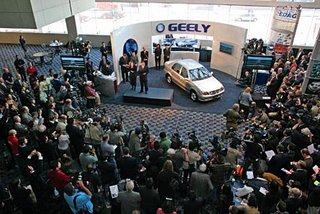At a time when virtually everything Americans buy is stamped Made in China and the U.S. auto industry is suffering another shuddering contraction, it's easy to imagine America's automotive landscape overrun with Chinese-made autos, many of them probably purchased at Wal-Mart.
If the Japanese and the Koreans have wounded the U.S. auto industry, surely the Chinese will crush it the way they have textiles and toymaking.

Not so fast. Yes, the West increasingly will use China as a cheap source of labor to make parts for Chevrolets, Nissans, Volkswagens, and others. Eventually, those cars may even be assembled in China. But despite all the red flags in the press, in reality, China's automakers won't become significant exporters to the United States for decades, if ever. Here's why:
Quality. China's quality is not good enough for America (or Europe or Japan) despite joint ventures with firms such as GM, VW, PSA Peugeot Citro‰n, Hyundai, and Toyota. Chinese cars currently are sold at knock-off prices only in soft markets such as Syria, Algeria, and Egypt.
Disorganization. China's auto industry today resembles America's at the start of the twentieth century. There are dozens of small, local enterprises with more ambition than ability. Most lack the skills, technology, and financing to survive and will disappear as surely as forgotten U.S. firms such as Franklin, Maxwell, and Reo. Only ten of China's 100 or so firms make more than 100,000 vehicles per year. Seventy of them produce fewer than 10,000. Exports will account for less than one percent of the nearly three million cars China will build in 2006. International success will require major consolidation.
Home-market demand. China has one of the lowest motorization rates in the world. With a growing economy, buyers there will snap up everything its factories make for years to come.
Brands. With the dubious exception of Nanjing's MG, none of China's carmakers owns a marque that is recognizable outside the country. This absence of brand and image is the most serious flaw in China's great automotive scheme. Note the words of Michael Ganal, head of sales and marketing at BMW, the group that wrote the book on automotive branding: "Strong brands are the most desirable asset for any company."
Sure, China's automakers will address the challenges. They can buy expertise and technology from the West, consolidate, make more and better vehicles, and build their own nameplates. But the process will take a long, long time-and by then, Wal-Mart may have gone the way of Woolworth's.
No comments:
Post a Comment